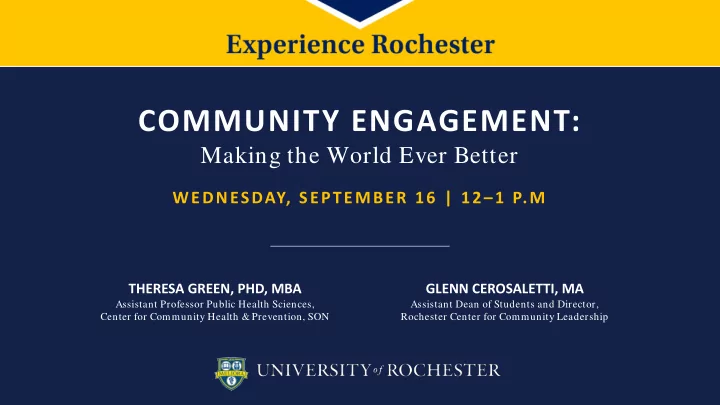

COMMUNITY ENGAGEMENT: Making the World Ever Better WEDNESDAY, SEPTEMBER 16 | 12–1 P.M THERESA GREEN, PHD, MBA GLENN CEROSALETTI, MA Assistant Professor Public Health Sciences, Assistant Dean of Students and Director, Center for Community Health & Prevention, SON Rochester Center for Community Leadership
HISTORICAL CONTEXT The aim of education is not only to “ prepare students for productive careers, but also to enable them to live lives of dignity and purpose; not only to generate new knowledge, but to channel that knowledge to humane ends; not merely to study government, but to help shape a citizenry that can promote the public good. Thus, higher education's vision must be widened if the nation is to be rescued from problems that threaten to diminish permanently the quality of life” —ERNEST L. BOYER, SCHOLARSHIP RECONSIDERED: PRIORITIES OF THE PROFESSORIATE (1990)
WHY COMMUNITY ENGAGEMENT? • Community Engagement can harness the skills and talents of a community’s most important resource: Its PEOPLE. • Involving community members in initiatives can foster connectedness and trust, improve assessment efforts, and build the capacity of individuals to positively affect their community. • Additionally, community engagement can enhance the effectiveness of proposed strategies and increase the sustainability of efforts. cdc.gov/healthequityguide
HOW DOES THE UNIVERSITY DEFINE COMMUNITY ENGAGEMENT? • COMMUNITY ENGAGEMENT is the collaboration between institutions of higher education and their larger communities (local, regional/ state, national, global) for the mutually beneficial exchange of knowledge and resources in a context of partnership and reciprocity. • Carnegie definition (University of Rochester application submitted April 2019) • COMMUNITY-ENGAGED SCHOLARSHIP is the generation of new knowledge through the combining of academic expertise and community-based expertise, eliminating a hierarchy of knowledge and establishing a mutually beneficial two-way exchange of knowledge and resources.
COMMUNITY ENGAGED SCHOLARSHIP CBPR begins with a research topic of importance to the community and actively engages community members throughout the project, from development to completion and dissemination, for the mutually beneficial exchange of knowledge and resources in a context of partnership and reciprocity.
GUIDING PRINCIPLES OF COMMUNITY-ENGAGED RESEARCH • Long term engagement • Evidence-based • Mutual benefit • Collaborative from start to finish • Mutual respect • Responsive to community • Shared findings priorities and perspectives • Enhanced community capacity • Shared responsibility Developed by the University of Rochester Medical Center (URMC) Community Advisory Board, Approved September, 2008
LOCAL COMMUNITY CONTEXT
AN EVOLVING UNIVERSITY TRADITION OF BROAD AND PERVASIVE ENGAGEMENT • Voter registration and political engagement • National service programs • Student organizations and SROs • Fraternities and sororities • Athletics and Recreation • Interfaith Chapel • Libraries • Social innovation • Arts and humanities • Community health
WELL-DESERVED RECOGNITION COMMUNITY ENGAGEMENT IN: • Leadership and Mission • Faculty and Curriculum • Students and Co-Curricular • Outreach and Partnership • Data and Assessment • Promotion throughout the institution
INVENTORY OF COMMUNITY PARTNERSHIPS UNIQUE PARTNERSHIPS: DEPTH OF PARTNERSHIP • Common Ground Health • 27—Art Science Engineering • City of Rochester & Monroe County • 191—School of Medicine Dentistry • EAST & Rochester City School District • 10—School Of Nursing • Alzheimer’s Association • 15—Eastman School of Music • Refugees Helping Refugees • 20—Warner • Healthy Baby Network • 76—Central Admin & Affiliates • Lifespan • Foodlink 35 community organizations have • Gateways Music Festival multiple partnerships at the UR • NEAD with RCSD having the most at 18 .
Recommend
More recommend